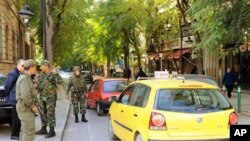Reports of looting and unrest continue, but calm is slowly returning to Tunisia, following two chaotic days that saw the country's long-time president flee the country and an interim leader assume power.
After a quiet morning, scattered violence returned to Tunisia's capital after midday. Helicopters flew overhead, new barricades were set up and sounds of shooting could be heard from the city center. Police again prevented guests in the hotels lining the main Habib Bouguiba Boulevard from venturing out.
A French photojournalist died from wounds he received by being hit with a tear-gas cannister Friday. Reporters Without Borders say police deliberately targeted him.
Tunisia's state news agency also reports police have arrested the head of the presidential guard of former Tunisian leader Zine el-Abidine Ben Ali, who fled the country Friday following massive anti-government protests.
Earlier in the day, the streets of Tunis were calm. There were signs everywhere that life was returning to normal after two days of protests and violence. A few cars and taxis sped down the streets. A few pedestrians ventured out. Although many stores remained shuttered, a few were open.
Even a few of the city's cafes were open, among them one on the Avenue de la Liberte, where men sat drinking coffee, smoking water pipes and listening to the latest news. One man, Mohammed, who sat outside the cafe with friends, said he was afraid.
Mohammed said his family was shaken by the violence of looters and gangs roaming the streets, particularly at night. He said people were proud of the liberty they hope they have realized following weeks of demonstrations. He wants democracy but also peace and stability.
Tanks are still stationed on many street corners and soldiers are out on the streets.
Like many Tunisians interviewed in recent days, Mohammed praises the army for establishing stability. But some members of the police force are viewed with suspicion, particularly those considered close to Ben Ali. Vandals have also attacked property belonging to Ben Ali's powerful family. Posters of the ex-president are slowly being taken down.
Many neighborhoods have set up their own civilian patrols to protect their goods. There are also reports of revenge attacks by people close to Ben Ali's government.
Tunisia's interim president, Fouad Mebazaa, has called for a transition unity party and democratic elections in two months. But it is unclear how the country will prepare for democracy after years of authoritarian rule.
Some Tunisians say the interim government should be given time. But critics like Radia Nasraoui, a prominent human rights lawyer in Tunisia, say it has no credibility.
Nasraoui said Tunisians must get rid of the transitional government, as they did Ben Ali. She says it is tied to the old, repressive system.
At the coffee house, 35-year-old Yasser said years of one-party rule had destroyed democratic institutions in Tunisia.
Yasser believes it will take several years to build a real democracy in Tunisia. Another man at the cafe said Tunisia needs to clear away its old mentality as a police state.




